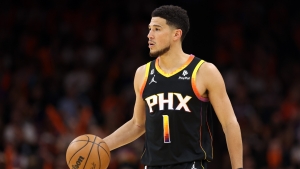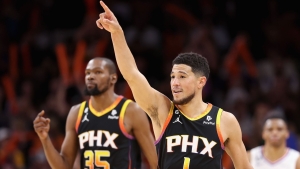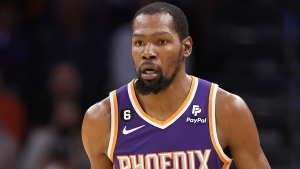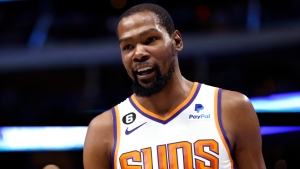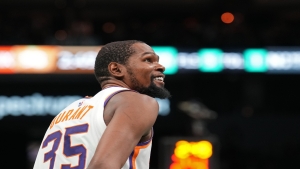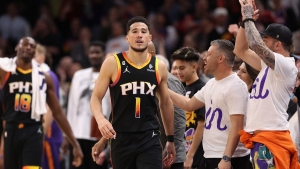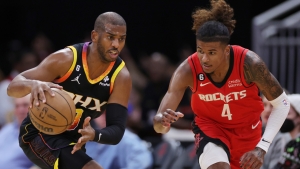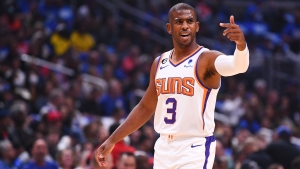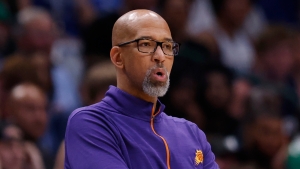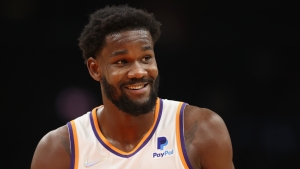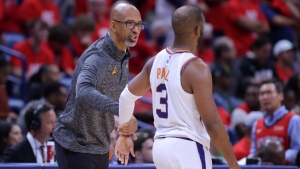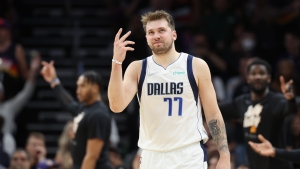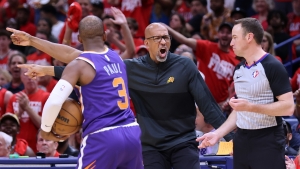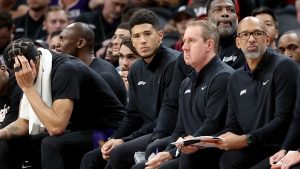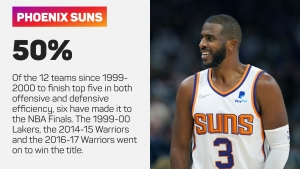Late in the NBA season it appeared the Phoenix Suns may finish top-two in both offensive and defensive efficiency – a feat only accomplished twice in the 21st century.
Those two teams were the 2014-15 and 2016-17 Golden State Warriors, who both went on to win NBA Championships.
As Phoenix wrapped up the top overall seed with weeks to spare, their total efficiency took a dip in the final games as Aaron Holiday was gifted starts, and the duo of Ishmail Wainwright and Gabriel Lundberg were playing nearly a combined 50 minutes.
For the season, the Suns finished with the third-ranked defense, giving up 106.8 points per 100 possessions, and the fifth-placed offense, scoring 114.2 points per 100 possessions, giving them a net-rating of 7.5 (7.4 gap between offense and defense, rounded up to the closest decimal).
The 'per 100 possessions' qualifier is simply to provide an even playing field for teams that play at different paces – the Dallas Mavericks are the slowest team in the league, getting 95.6 possessions per game, while the run-and-gun Minnesota Timberwolves average 101.5 possessions per game.
Since, and including, the 1999-00 season, the 2021-22 Suns are the 13th team to finish top-five in both offense and defense.
The other teams are:
1999-00 Los Angeles Lakers (fifth in offense, first in defense, 9.0 net-rating) 2001-02 Sacramento Kings (third in offense, fifth in defense, 8.1 net) 2005-06 Detroit Pistons (fourth in offense, fifth in defense, 7.6 net) 2006-07 Dallas Mavericks (second in offense, fifth in defense, 7.6 net) 2007-08 Lakers (third in offense, fifth in defense, 7.3 net) 2008-09 Cleveland Cavaliers (fourth offense, second defense, 9.6 net) 2009-10 Orlando Magic (fourth offense, fourth defense, 7.9 net) 2010-11 Miami Heat (second offense, fifth defense, 7.8 net) 2014-15 Warriors (second offense, first defense, 9.9 net) 2016-17 Warriors (first offense, second defense, 11.4 net) 2018-19 Milwaukee Bucks (first defense, fourth offense, 8.6 net)
Of those teams – all of which won at least 57 regular season games – half made it to the NBA Finals, while the 1999-2000 Lakers, 2014-15 Warriors and 2016-17 Warriors are the three to win championships. The reigning champion 2008-09 Celtics were the only side to not make it to the Conference Finals.
The 2005-06 Pistons were two seasons removed from their 2004 title; the 2006-07 Mavericks featured many of the pieces that would win the 2011 title; the 2007-08 Lakers stuck with it and won back-to-back in 2009 and 2010; the 2010-11 Heat won back-to-back in 2012 and 2013; and the 2018-19 Bucks just needed to add Jrue Holiday to push themselves over the line in 2021.
What this means is that while this specific Suns side may not be guaranteed to win this year's championship, they have a great chance to make the NBA Finals, and it shows that as an organisation, they have hit a sweet spot that very few sides ever reach, right in the heart of a true championship window.
However, none of those teams had their championship windows opened with the arrival of a 36-year-old. While the Suns are at a stage where they do not simply live and die with the health of Chris Paul, they are very clearly not the same team when he sits.
The Suns are 53-12 in the 65 games Paul has played this season, and are still an impressive 11-6 without him, showing that he has helped turn the franchise around in a real way.
Paul's biggest contribution to the Suns has been culturally, turning a perennial losing side into a team that expects to win every time it steps on the floor, no matter who is suiting up.
He has now been a member of the best regular season teams in the history of four franchises – the New Orleans Pelicans, the Los Angeles Clippers, the Houston Rockets and now the Suns.
However, it would be silly to discount the improvements Phoenix were making prior to Paul's arrival, including going 8-0 in 'the bubble' ahead of the 2020 Playoffs. Much of that credit also goes to head coach Monty Williams, who has the Suns playing a system that seems to work no matter who is on the floor, especially at the center position.
After being released by the Charlotte Hornets, Bismack Biyombo was picked up on a minimum contract and produced the most efficient scoring season of his career, registering 15 points and grabbing 12 rebounds per-36 minutes.
Career backup JaVale McGee has also been terrific, scoring 20.9 points and grabbing a career-high 15 rebounds per-36 in his 14th season in the league.
For the season, McGee leads the Phoenix center trio in player efficiency rating (PER, where league-average is always 15) with 22.5, while Deandre Ayton is at 22.0 and Biyombo at 17.3.
The success of Phoenix's backup bigs has added fuel to the fire regarding the impending contract extension of Ayton, who the Suns made the first overall pick in the 2019 NBA Draft.
Ayton was eligible for a big-money extension this past off-season, but the organisation opted to wait until after this season when his contract expires, where they can decide if they feel he is worth the max-contract he is expected to demand, or if they are better served cashing on his perceived value through a trade.
Phoenix are paying Paul and Devin Booker max-contract money, and Defensive Player of the Year candidate Mikal Bridges signed a four-year, $90million extension in December, which was considered a bargain for a player of his two-way impact.
The Suns have likely built something sustainable, but they are set to become one of the more expensive teams in the league, with an owner, Robert Sarver, who has never shown the willingness to go deep into the luxury tax.
While Paul's days as a superstar are likely numbered with his advanced age, Booker and Bridges are both 25 and yet to hit their prime, while Ayton – whether he is viewed as a cornerstone of the future or as a premium trade asset – is just 23.
However, chemistry can be everything and this team, as is currently constructed, has it in spades.
It is easy to see how this could be the start of an incredible decade of Suns basketball – they are mostly young, and just set a franchise-record for wins in a season with 64.
But they are outliers this year, and outliers come back to earth at some stage – often sooner than we expect.
























